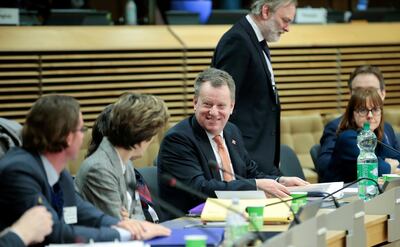British Prime Minister Boris Johnson’s appointment of an inexperienced national security adviser has been criticised as politicising a crucial role in government, security sources have said.
Instead of selecting a highly qualified civil servant from the Ministry of Defence or Foreign Office, Mr Johnson has chosen David Frost to become the UK’s new NSA, the top defence and security job.
As the government’s chief negotiator on Brexit Mr Frost is seen as very close to the prime minister but he has very little national security experience.
The appointment comes after the sudden departure of Sir Mark Sedwill, who held both the roles of cabinet secretary, the most senior civil servant, and NSA, a role he held since 2017.
It is understood that he fell out with the Mr Johnson last month when he abruptly told the prime minister that it was his sole responsibility to take Britain out of lockdown.
Many in Westminster view Mr Sedwill’s departure as a coup for the prime minister’s most senior adviser, Dominic Cummings, in his bid to purge the civil service before implementing radical reforms.

It also means that the hard Brexit agenda in Downing Street will face less opposition with Mr Sedwill being a supporter for former prime minister Theresa May’s more emollient approach.
With a first class degree in French and history from the University of Oxford, Mr Frost is intelligent and considered a good thinker able to understand his brief quickly.
He was originally a diplomat at the Foreign Office, serving as ambassador to Denmark, before leaving government to become chief executive at the Scotch Whisky Association. He left to become Boris Johnson’s special adviser when he was foreign secretary.
But his NSA appointment has caused concern it would vastly politicise a position that is meant to give the prime minister impartial advice on the most important national security issues.
“I don’t think this can be interpreted as anything other than an overtly political appointment,” said Professor Michael Clarke of the Royal United Services Institute. “You could argue that this could turn out be a good thing having an NSA who is a more powerful figure, an intellectual driver closer to the PM a bit more in the Henry Kissinger role. It’s not necessarily a misstep.”
There are concerns among the security community that he brings little experience to the job that requires considerable understanding of the military, intelligence services and the police.
“David Frost is a very bright and very pugnacious man but I cannot see what qualifies him for this job other than his extreme loyalty to Boris Johnson and his closeness to the Cummings network inside Downing Street,” said a security official. “His background is a way away from security, of being involved in the deeper and sensitive issues, and he has no acquaintance with the intelligence community nor indeed with the policing side.”

Others have argued that the role needs to be more politicised to drive through the prime minister’s agenda on security issues, similar to the American system. Also having one person solely dedicated to the job will bring greater focus after Mr Sedwill shared it with his cabinet secretary role.
The NSA role was created in 2010 as part of reforms to make the UK’s national security more focused and included the creation of the National Security Council, chaired by senior cabinet members and intelligence chiefs.
All four previous NSAs had worked extensively in either the Ministry of Defence or Foreign Office and had, unlike Mr Frost, in-depth security experience. Lord Peter Ricketts, a former NSA tweeted: “That completely changes the nature of the role. No longer a politically neutral civil servant giving dispassionate advice.”


